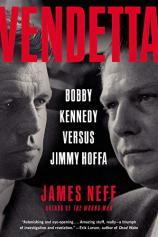Vendetta: Bobby Kennedy Versus Jimmy Hoffa
Review
Vendetta: Bobby Kennedy Versus Jimmy Hoffa
To many people in 2015, the idea that vast political and legal resources of the legislative and executive branches of our government would be devoted to bringing down a powerful labor union leader probably seems quaint. But that's exactly what happened in the seven-year-war Robert Kennedy waged in the 1950s and ’60s against Teamsters Union boss Jimmy Hoffa. In VENDETTA, Seattle investigative reporter James Neff has turned that confrontation into an epic tale of ambition and the struggle for power.
From January 1957 until September 1959, what became known as the Senate Rackets Committee --- under the chairmanship of conservative Arkansas Democrat John McClellan and with Robert Kennedy as its chief counsel supported by a staff of as many as 100 lawyers, accountants and others --- conducted a relentless investigation that focused on corruption among the leadership of the 1.4-million-member International Brotherhood of Teamsters. At the time that the committee's investigation commenced, Hoffa was a Teamsters vice president, and when the inquiry ousted then-president Dave Beck, that victory had the unintended effect of propelling Hoffa to the top of the union in 1958. As Neff describes in a swift-moving narrative, the road to the top was a rocky one, as Hoffa, with the aid of aggressive criminal defense lawyers like the famed Edward Bennett Williams, had to dodge charges of bribery, perjury and conspiracy to commit wiretapping to maintain his iron grip on Teamsters leadership.
"James Neff has imbued what could have been an arid account of courtroom and hearing room proceedings with the vivid human drama that brings these characters and their titanic battle back to life."
The sheer magnitude of the effort to topple Hoffa, as Neff describes it, was daunting. Given the technology of the time, which had investigators copying tax returns by hand and meticulously indexing and cross-referencing information on three-by-five-inch cards, one wonders what Kennedy would have done with modern information acquisition and management techniques. One fascinating aspect of the book involves the cat-and-mouse game that Kennedy's investigators played with Hoffa, with both sides employing sophisticated (for that era) wiretapping and electronic surveillance techniques.
By the fall of 1959, as many as 12 grand juries were investigating the activities of Hoffa and his associates. Inevitably, the sheer number and complexity of these legal proceedings force Neff to treat some of them in a cursory fashion. The thoroughness of his decade-long research, which included accessing Rackets Committee files not open to view until 2007, is evident, but the book would have been improved by a timeline and capsule biographies of the main characters.
Kennedy's departure from the committee to manage his brother's 1960 White House run (an effort Hoffa worked mightily to defeat) and his appointment as attorney general marked merely a change in the focus of the pursuit of Hoffa, not a diminution in its intensity. Despite including key Senate committee staffers like Walter Sheridan and Carmine Bellino on what was dubbed the "Get Hoffa" squad in the Justice Department, Kennedy's crack team of attorneys still took three years to convict Hoffa of jury tampering and fraud in Chattanooga and Chicago in 1964. Though his sympathies clearly reside with Kennedy, Neff isn't reluctant to point out where he believes highly skilled federal prosecutors were guilty of overreach.
Neff succeeds in portraying his protagonists' visceral hatred for each other. At times, that animosity reached absurd levels. At Hoffa's March 1957 arraignment on charges of trying to bribe a Rackets Committee staffer, the two men, both of relatively small stature, engaged in a childish argument about who could do the most pushups. Their mutual antipathy was deep and anything but trivial, as Neff reveals through well-chosen anecdotes. When Hoffa learned of President Kennedy's assassination, for example, Neff reports that the union leader climbed on a restaurant chair and cheered. Robert Kennedy was sufficiently concerned about Hoffa's possible involvement in his brother's murder that he inserted one of his loyalists on the staff of the Warren Commission with instructions to report any information confirming that suspicion.
Despite clear evidence that Hoffa excelled at self-dealing in an array of dubious investments, from Florida real estate to racetracks, Neff is not blind to the fact that he accomplished much to benefit the Teamsters rank-and-file. "Hoffa left a record of bringing superior job benefits to millions of members and much-needed stability to the trucking industry," he notes. "But his impressive gains were overshadowed by the misdeeds that enabled the Kennedys, the McClellan committee, and others to broadly tar all Teamsters with the crimes of a few."
Barely a decade after Hoffa went to federal prison, the story had ended violently for both men: Kennedy dead of an assassin's bullet at the peak of his 1968 presidential campaign, and Hoffa abducted from a suburban Detroit restaurant in 1975, never to be seen again, as he attempted to ascend to power again in the Teamsters Union. James Neff has imbued what could have been an arid account of courtroom and hearing room proceedings with the vivid human drama that brings these characters and their titanic battle back to life.
Reviewed by Harvey Freedenberg on July 16, 2015
Vendetta: Bobby Kennedy Versus Jimmy Hoffa
- Publication Date: July 5, 2016
- Genres: History, Nonfiction, Politics
- Paperback: 400 pages
- Publisher: Back Bay Books
- ISBN-10: 0316067423
- ISBN-13: 9780316067423





